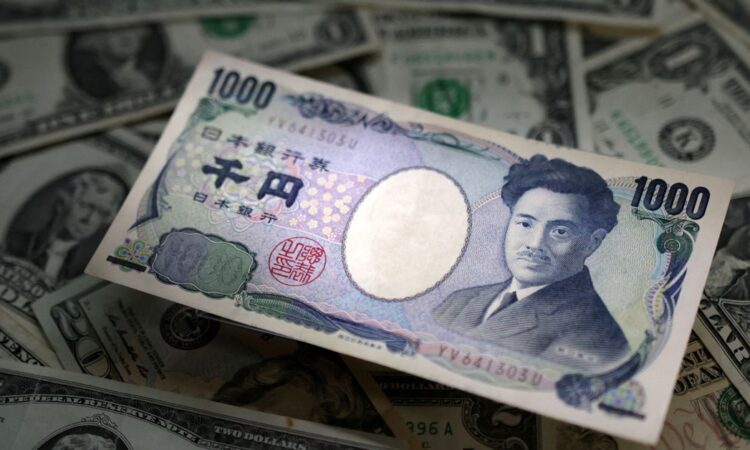
SINGAPORE, May 5 (Reuters) – The yen was eyeing its first weekly gain in nearly a month on Friday, driven by safe haven demand as bank sector turmoil in the United States unfolds, while the dollar fell as traders priced in more aggressive rate cuts from the Federal Reserve.
The euro edged away from its recent one-year peak and last stood at $1.1034, after the European Central Bank (ECB) on Thursday slowed the pace of its interest rate increases with a 25-basis-point hike.
While ECB President Christine Lagarde signalled more tightening to come, markets pared back their expectations on how much further rates would continue to rise.
“Lagarde was hawkish in her press conference, but I think financial markets didn’t really buy her view on further rate rises in coming months,” Carol Kong, a currency strategist at Commonwealth Bank of Australia, said.
In the broader currency market, the yen was last 0.2% higher at 134.02 per dollar, and was headed for a weekly gain of over 1.5%, snapping three straight weeks of losses.
“The Japanese yen has slowly gained back its appeal of safe haven status, and has definitely been supported by concerns about U.S. regional banks and the associated safe-haven demand,” Kong said.
A deepening crisis across U.S. regional banks have kept investors on tenterhooks, with pressure growing on U.S. regulators to take more steps to shore up the sector.
Shares of PacWest Bancorp (PACW.O) plunged on Thursday, dragging other regional lenders down after the Los Angeles-based bank’s plan to explore strategic options heightened investor fears.
Canada’s Toronto-Dominion Bank Group (TD.TO) on Thursday also called off its $13.4 billion takeover of First Horizon Corp (FHN.N), in another sign of stress within the sector.
Traders have since priced in more aggressive rate cuts from the Fed, with Fed funds futures implying a small chance that cuts could come as soon as June and through to the end of the year.
That left the greenback broadly lower on Friday, with the dollar index slipping 0.11% to 101.23.
Sterling rose 0.16% to $1.2595.
“For the Fed’s June decision, inflation data and employment indicators … along with bank lending standards will be key to watch. The debt ceiling negotiations are another important risk,” said Sonia Meskin, head of U.S. macro at BNY Mellon.
“We believe the Fed is unlikely to contemplate cutting rates before 2024.”
April’s nonfarm payrolls report is due later on Friday, the next major data point that will offer further clues on the Fed’s fight against inflation.
Data released earlier this week showed that the U.S. services sector maintained a steady pace of growth in April, suggesting that inflation remains sticky, while U.S. private employers boosted hiring last month.
Down Under, the Australian dollar rose 0.26% to $0.6711, while the kiwi touched a three-week high of $0.6311.
The Reserve Bank of Australia, in a quarterly statement on monetary policy on Friday, warned that risks to inflation were on the upside given low productivity growth, rising energy prices and a surge in rents as population growth outpaces all expectations.
Reporting by Rae Wee; Editing by Jacqueline Wong
Our Standards: The Thomson Reuters Trust Principles.




